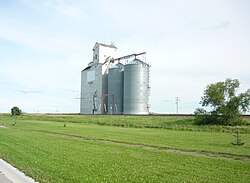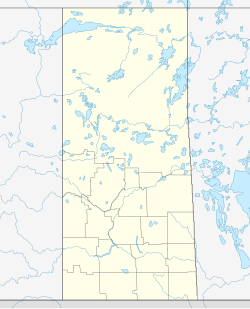Pense, Saskatchewan
Pense | |
|---|---|
Town | |
| Town of Pense | |
 Grain elevator | |
| Coordinates: 50°24′55″N 104°59′05″W / 50.41528°N 104.98472°W | |
| Country | Canada |
| Province | Saskatchewan |
| Rural municipality | Pense |
| Post Office established | 1883 |
| Village[1] | March 7, 1904 |
| Town[1] | October 24, 2012 |
| Government | |
| • Administrator | Jennifer Lendvay |
| • M.L.A. Thunder Creek | Lyle Stewart |
| • M.P. Palliser | Ray Boughen |
| Area | |
| • Land | 1.32 km2 (0.51 sq mi) |
| Population (2011) | |
| • Total | 532 |
| • Density | 402.6/km2 (1,043/sq mi) |
| Time zone | UTC-6 (UTC) |
| Postal code | S0G 3W0 |
| Area code | 306 |
| [2][3] | |
Pense is a town of 603 residents (2021 census[4]) in the southern part of Saskatchewan, Canada. Heading west from Regina on the Trans Canada Highway, Pense is the first community with services. Other communities in the area include Grand Coulee, Belle Plaine, Disley, and Rouleau. Pense is approximately 30 km (19 mi) from the City of Regina. The current mayor of Pense is Angela Neumann.
Demographics[edit]
In the 2021 Census of Population conducted by Statistics Canada, Pense had a population of 603 living in 210 of its 228 total private dwellings, a change of 2.7% from its 2016 population of 587. With a land area of 1.32 km2 (0.51 sq mi), it had a population density of 456.8/km2 (1,183.2/sq mi) in 2021.[4]
|
Canada census – Pense community profile
|
Destruction of grain elevator[edit]
On May 3rd, 2021, the grain elevator in Pense was demolished, 20 years after it was shut down by Viterra in 2001.
References[edit]
- ^ a b "Urban Municipality Incorporations" (PDF). Saskatchewan Ministry of Government Relations. p. 11. Archived from the original on October 15, 2014. Retrieved February 5, 2017.
- ^ National Archives, Archivia Net, Post Offices and Postmasters, retrieved 2007-05-26
- ^ Government of Saskatchewan, MRD Home. "Municipal Directory System". Retrieved 2013-11-26.
- ^ a b "Population and dwelling counts: Canada, provinces and territories, census divisions and census subdivisions (municipalities), Saskatchewan". Statistics Canada. February 9, 2022. Retrieved April 1, 2022.
- ^ "2021 Community Profiles". 2021 Canadian Census. Statistics Canada. February 4, 2022. Retrieved 2022-04-27.
- ^ "2011 Community Profiles". 2011 Canadian Census. Statistics Canada. March 21, 2019. Retrieved 2013-11-26.
- ^ "2006 Community Profiles". 2006 Canadian Census. Statistics Canada. August 20, 2019.
- ^ "2001 Community Profiles". 2001 Canadian Census. Statistics Canada. July 18, 2021.



